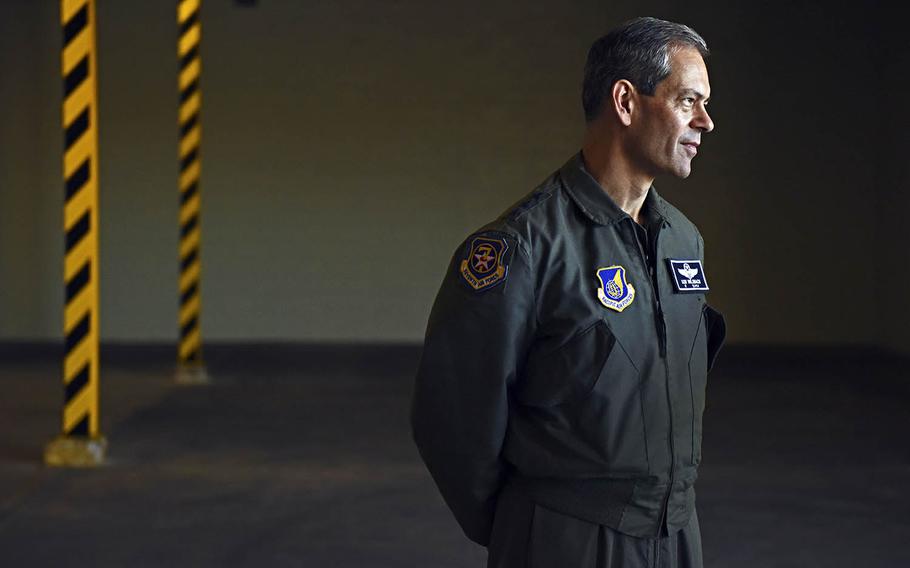
The commander of Pacific Air Forces, Gen. Kenneth Wilsbach, pictured here in November 2019, told U.S. troops they must be ready for conflict with China amid rising tensions, Friday, Nov. 6, 2020. (Mackenzie Mendez/U.S. Air Force)
YOKOSUKA NAVAL BASE, Japan — U.S. troops must be ready for conflict with China as tensions between the two nations simmer, Pacific Air Forces’ leaders said Friday during a Facebook Live video call to airmen in Japan.
Beijing, with its “maligned and coercive activity that’s frequently not in accordance with international law,” is the greatest challenge facing the region, PACAF commander Gen. Kenneth Wilsbach said on the call.
“We’ve got to challenge and compete with them in accordance with the national (defense) strategy, but we also have to be ready in the event we get called to go fight tonight,” he said.
China’s “disturbing” behavior, Wilsbach said, includes its “crackdown on the democratic process” in Hong Kong that sparked unrest last year, its recent border clashes with India and its militarization and island-building in the South China Sea.
Beijing believes it has a historic right to the region, pointing to early maps China published that claim the South and East China Seas as its own. However, a United Nations panel in 2016 rejected these claims in a ruling in a case brought by the Philippines.
“[They are] making new islands in the South China Sea and saying that it’s always been that way and it’s Chinese territory — and it hasn’t,” Wilsbach said. “That’s revisionist history.”
Wilsbach criticized China for “threatening action” when U.S. military ships and aircraft approach “not even close to the 12-mile territory of China,” referring to the distance from coastlines that makes up a nation’s territorial waters under international maritime law.
“All that maligned activity is causing a lot of consternation with us and with our allies and partners in the region because we … are looking for a free and open Indo-Pacific, which includes open commerce, open seas [and] open skies to be used in accordance with international law,” Wilsbach said.
U.S. allies and partners in the Indo-Pacific region are key to its advantage, Wilsbach said. Regular training and work with other nations’ militaries are done “so that eventually we can become interoperable and maybe even integrated.”
The U.S. military uses the term “interoperability” to describe the ability of a country’s armed forces to use another country’s training methods and military equipment. Frequent exercises with Japan’s Self-Defense Forces and Australia’s navy are examples of interoperability.
“That’s something that our adversary really has to calculate through if they want to have a conflict with us,” Wilsbach said on the call. “In short, it becomes a deterrent value before the fight starts.”
Should conflict break out, that ability to fight alongside partners “becomes a great asset because our strengths are much greater together than they are alone,” he said.
Current operations in the Pacific aim to “push out the timeline” of Beijing’s aggressive behavior, PACAF Chief Master Sgt. David Wolfe said during the call.
“We’ve got to do everything we can to present different decisions to our adversaries in the Pacific that causes them to delay their ultimate goals,” he told the airmen, “and that’s what you guys are doing out there every single day.”
“If you don’t think that you’re participating in conflict, you know, kind of below that kinetic level right now — you are,” Wolfe added. “You absolutely are.”